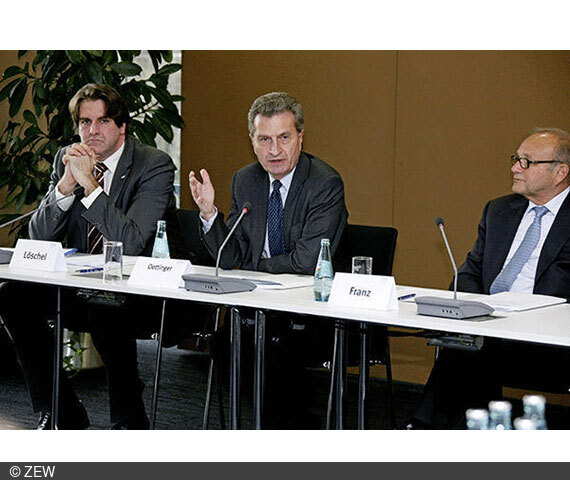EU Commissioner for Energy Oettinger Visits ZEW for an Exchange of Ideas on Energy Policy in Germany and in Europe
Dates and NewsThe European Commissioner for Energy, Günther Oettinger, visited the Centre for European Economic Research (ZEW) in Mannheim today. In a round table, he discussed the future design of German and European energy policy with personalities from the areas of business and politics from the Rhine-Neckar metropolitan region and with ZEW researchers.
Inviting the Commissioner for Energy to a talk with practitioners and policy makers of the metropolitan region provides an opportunity for contributing proposals and ideas to the European discussion on energy policy in a dialogue with the decision-makers in the European Commission. Günther Oettinger also took the opportunity of his visit at ZEW to say goodbye to Prof. Dr. Dr. h.c. mult. Wolfgang Franz, who will retire from his position as ZEW President at the end of February 2013.
The main focus of the round table discussion was on the challenges Germany and Europe will face in the next years in the areas of energy and climate protection. The discussion covered ways to realise an efficient and flexible European domestic energy market to guarantee an affordable and secure energy supply of households and companies, as well as the current state of the energy transition in Germany.
European Commissioner Oettinger warned against too many unilateral actions by Germany. According to him, Germany will only be able to achieve energy and climate policy goals in the framework of a European energy strategy, if it doesn’t want to harm its industrial core. In a world which is increasingly characterised by the use of electronic machines and devices, energy consumption will remain on a high level. So, according to Oettinger, it is important to act with a sense of proportion and not in an overhasty manner. Deciding a quick exit from nuclear energy without defending energy production via coal against those who are in favour of a quick exit from fossil fuels too is, according to Oettinger, no reasonable energy strategy. After all, 46 per cent of Germany electricity is still generated using coal, and plenty of work remains to be done producing the base load power, which has to be replaced due to the shut-down of nuclear plants, through other energy sources.
Regarding the reduction of CO2, the European Commissioner for Energy advises to go for a European strategy, too. Germany is responsible for a share of two per cent of the global CO2 production. Through German reduction efforts only, there would be not much to win. Only in cooperation with the European partners, he outlines, real achievements can be made.
Information on ZEW's research in the areas of energy and climate was provided by the head of ZEW's Research Department of Environmental and Resource Economics, Prof. Dr. Andreas Löschel, who is also the main author of the fifth Assessment Report (2010-2014) of the United Nations' "Intergovernmental Panel on Climate Change" (IPCC). Günther Oettinger and the participants at the round table were also very interested in Löschel’s explanations concerning the present state of the German energy transition, since the ZEW energy expert chairs the federal government’s expert commission for the monitoring process “Energie der Zukunft” (Energy of the Future). Löschel emphasised: "The present assessment of the German energy transition is mixed. In some areas we’re on a good way, for example when it comes to the extension of renewables. This is associated with increasing costs, which still seem tolerable, but which have to be observed closely in the future. In other areas, the energy transition has not gone that far. Examples are energy efficiency and the grid expansion."
For further information please contact
Prof. Dr. Andreas Löschel, Phone +49 621/1235-200, E-mail loeschel@zew.de
